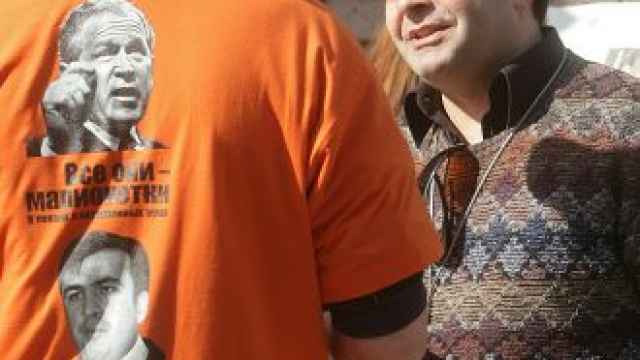A Moscow court has rejected a defamation lawsuit filed by Nashi against opposition leader Ilya Yashin over his accusations that the pro-Kremlin youth group had made Internet videos targeting opposition politicians and journalists.
The Tverskoi District Court ruled that Yashin, a leader of the Solidarity opposition group, did not need to retract the accusations he made in a March 18 interview with the Vremya Novostei newspaper, Yashin wrote on his blog Friday.
In March, clips suggesting that Yashin, independent political analyst Dmitry Oreshkin and Russian Newsweek editor-in-chief Mikhail Fishman had given bribes to traffic police were posted on Nashi's web site. Fishman and Yashin said the videos were doctored footage and denied they had paid the bribes.
In Vremya Novostei, Yashin accused "people close to Nashi" of being involved in the production of the videos.
Then in late April, footage showing satirist and radio host Viktor Shenderovich; writer and Other Russia opposition movement leader Eduard Limonov; and Alexander Potkin, leader of the nationalist Movement Against Illegal Migrants, apparently having sex with the same woman made the rounds on the web.
Later that month, Yashin asked the Prosecutor General's Office, the Investigative Committee and the Interior Ministry to check whether Vladislav Surkov, first deputy head of the presidential administration, or Vasily Yakemenko, chief of the Federal Agency for Youth Affairs, were behind the March and April videos.
Surkov is widely believed to have created Nashi, while Yakemenko was its first leader and remains a patron of the group through his government post.
Yakemenko and his brother, Boris, leader of Nashi's Orthodox wing, have filed a similar defamation lawsuit against Yashin, Interfax reported. The lawsuit is being considered by Moscow's Perovsky District Court.
A Message from The Moscow Times:
Dear readers,
We are facing unprecedented challenges. Russia's Prosecutor General's Office has designated The Moscow Times as an "undesirable" organization, criminalizing our work and putting our staff at risk of prosecution. This follows our earlier unjust labeling as a "foreign agent."
These actions are direct attempts to silence independent journalism in Russia. The authorities claim our work "discredits the decisions of the Russian leadership." We see things differently: we strive to provide accurate, unbiased reporting on Russia.
We, the journalists of The Moscow Times, refuse to be silenced. But to continue our work, we need your help.
Your support, no matter how small, makes a world of difference. If you can, please support us monthly starting from just $2. It's quick to set up, and every contribution makes a significant impact.
By supporting The Moscow Times, you're defending open, independent journalism in the face of repression. Thank you for standing with us.
Remind me later.





